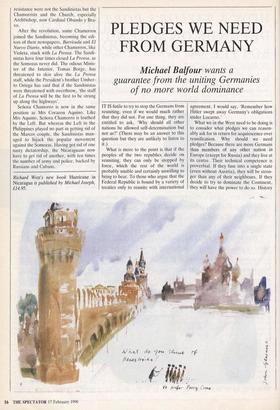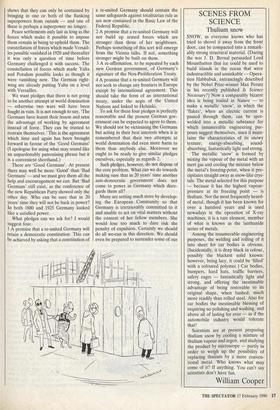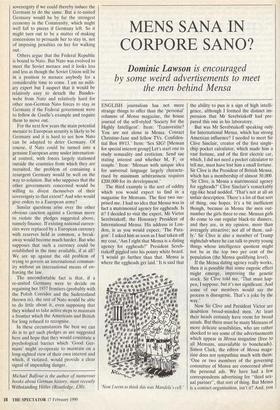PLEDGES WE NEED FROM GERMANY
Michael Balfour wants a
guarantee from the uniting Germanies of no more world dominance
IT IS futile to try to stop the Germans from reuniting, even if we would much rather that they did not. For one thing, they are entitled to ask, 'Why should all other nations be allowed self-determination but not us?' (There may be an answer to this question but they are unlikely to listen to it.) What is more to the point is that if the peoples of the two republics decide on reuniting, they can only be stopped by force, which the rest of the world is probably unable and certainly unwilling to bring to bear. To those who argue that the Federal Republic is bound by a variety of treaties only to reunite with international agreement, I would say, 'Remember how Hitler swept away Germany's obligations under Locarno,' What we in the West need to be doing is to consider what pledges we can reason- ably ask for in return for acquiescence over reunification. Why should we need pledges? Because there are more Germans than members of any other nation in Europe (except for Russia) and they live at its centre. Their technical competence is proverbial. If they fuse into a single state (even without Austria), they will be stron- ger than any of their neighbours. If they decide to try to dominate the Continent, they will have the power to do so. History shows that they can only be contained by bringing in one or both of the flanking superpowers from outside — and one of these is perhaps a superpower no longer.
Peace settlements only last as long as the forces which make it possible to impose them remain in being to uphold them. The constellation of forces which made Versail- les possible vanished in 1920 and thereafter it was only a question of time before Germany challenged it with success. The constellation of forces which made Yalta and Potsdam possible looks as though it were vanishing now. The German right- wing are already putting Yalta on a level with Versailles.
We want pledges that there is not going to be another attempt at world domination — otherwise two wars will have been fought in vain. It is not enough to say, 'The Germans have learnt their lesson and seen the advantage of working by agreement instead of force. They can be trusted to restrain themselves.' This is the agreement which time and again has been brought forward in favour of the 'Good Germans' (I apologise for using what may sound like an unpardonably patronising phrase but it is a convenient shorthand.)
There are 'Good Germans'. At present there may well be more 'Good' than 'Bad Germans' — and we must give them all the help and encouragement we can. But 'Bad Germans' still exist, as the conference of the new Republican Party showed only the other day. Who can be sure that in 20 years' time they will not be back in power? In both 1880 and 1925 Germany looked like a satisfied power.
What pledges can we ask for? I would suggest four.
I A promise that a re-united Germany will retain a democratic constitution. This can be achieved by asking that a constitution of a re-united Germany should contain the same safeguards against totalitarian rule as are now contained in the Basic Law of the Federal Republic.
2 A promise that a re-united Germany will not build up armed forces which are stronger than those of her neighbours. Perhaps something of this sort will emerge from the Vienna talks. If not, something stronger might be built on them.
3 A re-affirmation, to be repeated by each new German government, of Germany's signature of the Non-Proliferation Treaty.
4 A promise that a re-united Germany will not seek to change any frontiers in Europe except by international agreement. This should take the form of an international treaty, under the aegis of the United Nations and linked to Helsinki.
To ask for these four pledges is perfectly reasonable and the present German gov- ernment can be expected to agree to them. We should not be victimising the Germans but acting in their best interests when it is remembered that their two attempts at world domination did even more harm to them than anybody else. Moreover we ought to be ready to give similar pledges ourselves, especially as regards 2.
Such pledges, however, do not dispose of the core problem. What can we do towards making sure that in 20 years' time another anti-democratic government does not come to power in Germany which disre- gards them all?
Many are setting much store by develop- ing the European Community so that Germany is irretrievably committed to it and unable to act on vital matters without the consent of her fellow members. She would lose too much to dare risk the penalty of expulsion. Certainly we should do all we-can in this direction. We should even be prepared to surrender some of our sovereignty if we could thereby induce the Germans to do the same. But a re-united Germany would be by far the strongest economy in the Community, which might well fall to pieces if Germany left. So it might turn out to be a matter of making concessions to persuade her to stay in, not of imposing penalties on her for walking out.
Others argue that the Federal Republic is bound to Nato. But Nato was evolved to meet the Soviet menace and it looks less and less as though the Soviet Union will be in a position to menace anybody for a considerable time to come. I am no milit- ary expert but I suspect that it would be relatively easy to detach the Bundes- wehr from Nato and relatively hard for other non-German Nato forces to stay in Germany if the Federal government were to follow de Gaulle's example and require them to move out.
For the next few years the main potential menace to European security is likely to be Germany and it is hard to see how Nato can be adapted to deter Germany. Of, course, if Nato could be turned into a genuine European army under internation- al control, with forces largely stationed outside the countries from which they are recruited, the problem of containing a resurgent Germany would be well on the way to solution. But who supposes that the other governments concerned would be willing to divest themselves of their sovereignty to that extent? And who would give orders to a European army?
Similar questions arise over the other obvious sanction against a German move to violate the pledges suggested above, namely finance. If existing national curren- cies were replaced by a European currency with reserves held in common, a break- away would become much harder. But who supposes that such a currency could be established in the time available, if at all? We are up against the old problem of trying to govern an international commun- ity without an international means of en- forcing the law.
The uncomfortable fact is that, if a re-united Germany were to decide on regaining her 1937 frontiers (probably with the Polish Corridor and the Sudetenland thrown in), the rest of Nato would be able to do little about it, even supposing that they wished to take active steps to maintain a frontier which the Americans and British for long refused to recognise.
In these circumstances the best we can do is to get such pledges as are suggested here and hope that they would constitute a psychological barrier which 'Good Ger- mans' might co-operate to maintain on a long-sighted view of their own interest and which, if violated, would provide a clear signal of impending danger.
Michael Balfour is the author of numerous books about German history, most recently Withstanding Hitler (Routledge, £30).




















































 Previous page
Previous page